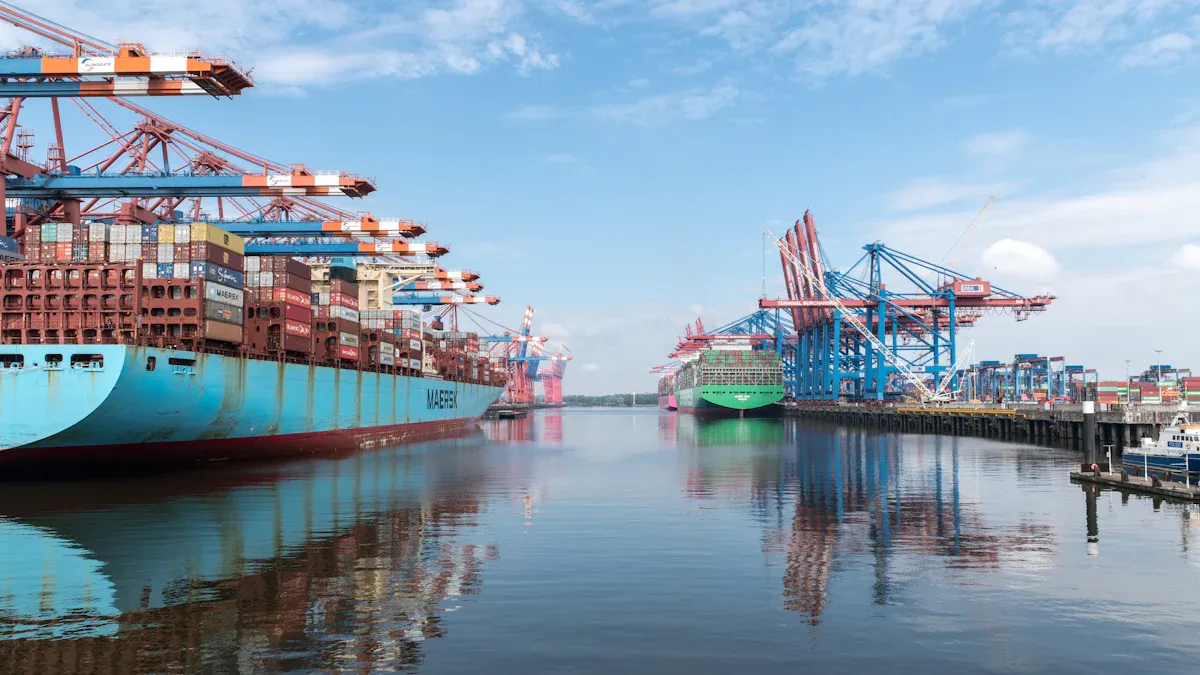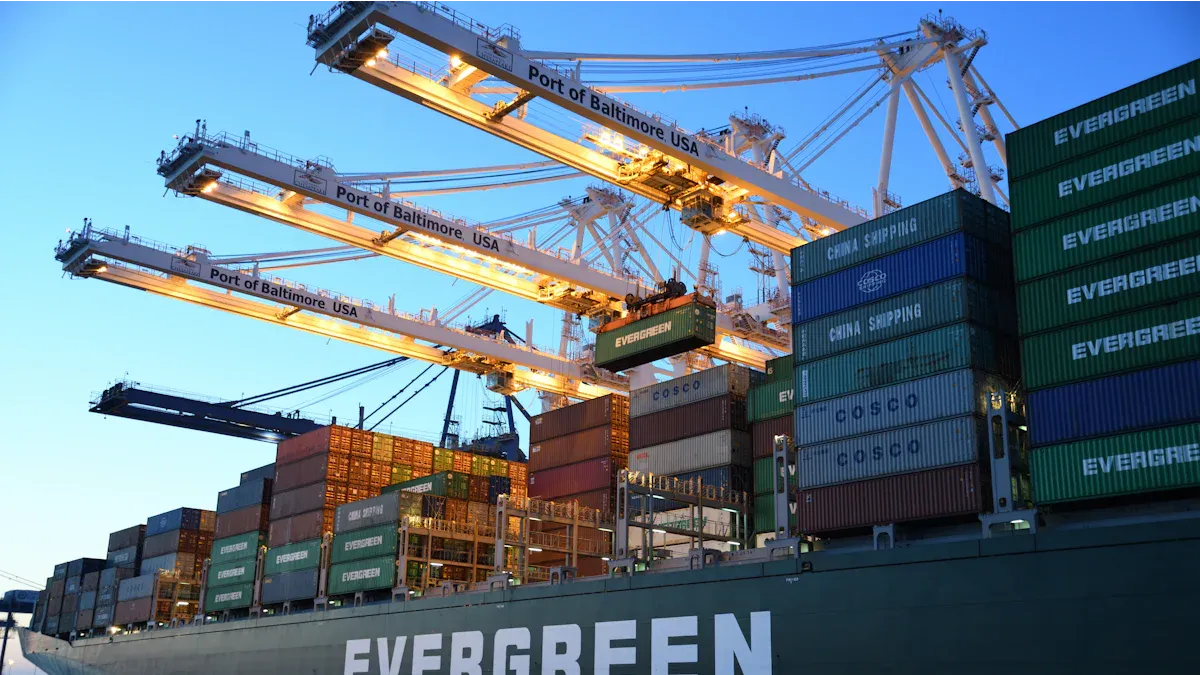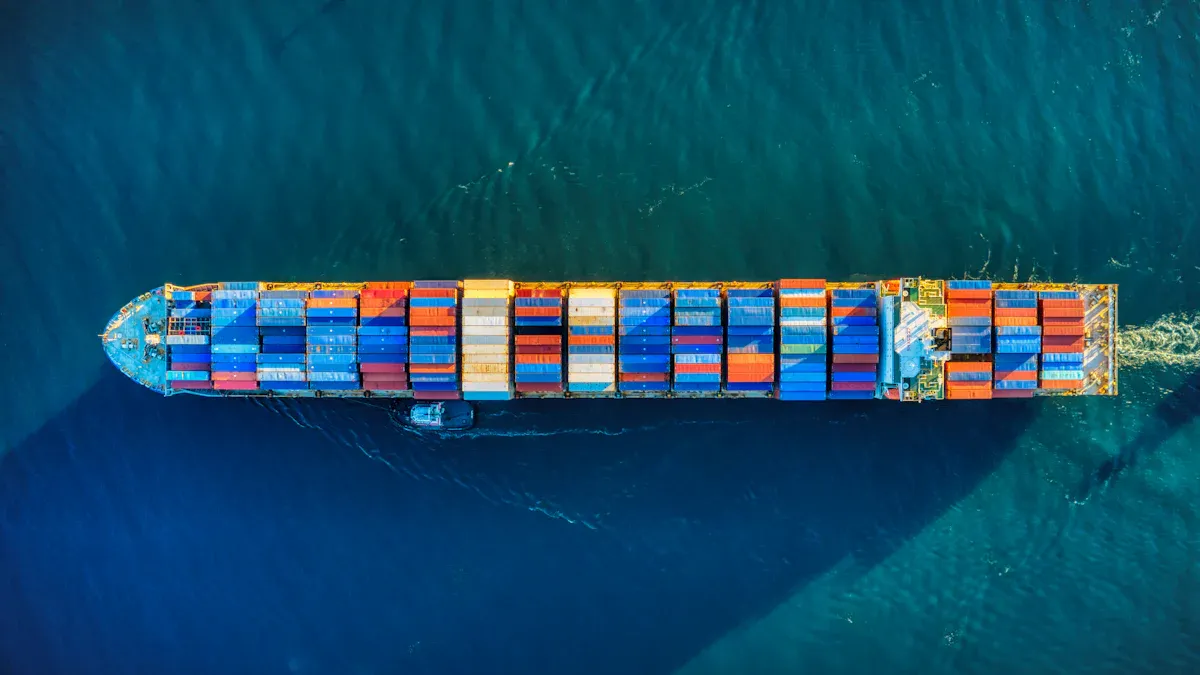Top 3 Shipping Lines Ranked by Service Quality

The shipping industry plays a crucial role in global trade. Among the leaders, the top 3 shipping lines—Mediterranean Shipping Company (MSC), A.P. Moller-Maersk, and CMA CGM—stand out for their exceptional service quality. These companies have built a strong reputation by consistently delivering excellence in shipping while shaping the future of logistics worldwide. Their influence extends across continents, making them indispensable to businesses.
What sets them apart? Factors like reliability, cost efficiency, customer service, and sustainability define their ranking. These elements ensure that each shipping carrier meets the diverse needs of a dynamic market. Whether it's managing massive cargo volumes or adopting eco-friendly practices, these top shipping lines continue to lead the way.
Key Takeaways
Mediterranean Shipping Company (MSC) is great for big shipments. It has large ships and good prices, making it popular.
A.P. Moller-Maersk is known for being reliable. It uses smart systems to make shipping easy for customers.
CMA CGM mixes new technology with eco-friendly choices. It helps businesses ship goods while caring for the planet.
Delivering on time is very important. These top companies use tracking tools to plan better and avoid delays.
Picking the best shipping company depends on what you need. Think about cost, trust, or being eco-friendly to keep customers happy.
Overview of the Top 3 Shipping Lines

Mediterranean Shipping Company (MSC)
Mediterranean Shipping Company (MSC) has grown into one of the largest shipping carriers in the world. With a fleet capacity of over 6 million TEU (twenty-foot equivalent units), MSC leads the global container shipping industry in fleet expansion. This shipping company operates across major trade routes, connecting businesses to markets worldwide. Its focus on innovation and sustainability has helped it maintain a competitive edge.
MSC uses a combination of drive, monitor, and outcome indicators to ensure its operations remain efficient and safe. These indicators guide safety-related activities, monitor system performance, and evaluate the results of its processes. By prioritizing these measures, MSC continues to deliver reliable shipping services to its customers.
A.P. Moller-Maersk
A.P. Moller-Maersk, often referred to as Maersk, is a pioneer among global shipping companies. Established in 1904, this shipping carrier has built a reputation for reliability and ethical leadership. Its board of directors ensures effective oversight, while transparent practices foster trust among stakeholders.
Maersk goes beyond shipping services by contributing to local communities. It conducts social impact assessments and supports initiatives in education, healthcare, and infrastructure development. Collaborating with NGOs and government agencies, Maersk enhances its social impact while maintaining its position as a leader in the shipping industry.
CMA CGM
CMA CGM, a French shipping company, is known for its commitment to digital innovation and sustainability. Operating a fleet of 566 vessels, it connects 420 ports across the globe. This shipping carrier has positioned itself as a strong competitor, with the potential to overtake Maersk in the rankings.
CMA CGM’s focus on digital services allows customers to track shipments in real-time, improving transparency and efficiency. Its sustainability initiatives, such as reducing carbon emissions, align with the growing demand for eco-friendly shipping solutions. By combining technology and environmental responsibility, CMA CGM continues to meet the needs of modern businesses.
Service Comparison of Top Shipping Carriers
Core Services Offered
Shipping carriers play a vital role in global trade by offering core services that ensure goods reach their destinations efficiently. Each of the top shipping companies—Maersk, MSC, and CMA CGM—has developed unique strengths in this area. These services include container shipping, bulk cargo handling, and specialized solutions for industries like e-commerce.
A closer look at their offerings reveals some key differences. Maersk stands out with its advanced digital platforms, which allow customers to track shipments in real-time. MSC, on the other hand, focuses on innovative digital solutions and competitive rates for large volumes. CMA CGM combines reliable schedules with digital tools, making it a strong choice for businesses seeking transparency and efficiency.
Here’s a quick comparison of their core services:
Shipping Carrier | Digital Services | On-Time Delivery | Safety Compliance | Pricing Model |
|---|---|---|---|---|
Maersk Line | Advanced platforms for tracking | High | Stringent adherence | Flat rates for certain routes |
MSC | Innovative digital solutions | Strong | Global standards compliance | Competitive rates for large volumes |
CMA CGM Group | Digital tools for tracking | Reliable | Rigorous safety protocols | Balances cost and service quality |
These carriers excel in providing reliable shipping services, making them indispensable for businesses, especially those involved in e-commerce fulfillment.
Value-Added Features
Beyond their core services, shipping carriers offer value-added features that enhance the overall shipping experience. These features often include supply chain integration, documentation management, and customer-focused innovations.
For instance, Maersk leads in supply chain integration, ensuring seamless cooperation between transport partners. This approach improves on-time delivery and boosts customer satisfaction. MSC emphasizes documentation management, streamlining processes like invoicing and cargo tracking. CMA CGM, meanwhile, focuses on sustainability, offering eco-friendly shipping options that align with modern business values.
Feature/Service | Description | Impact on Value |
|---|---|---|
Supply Chain Integration | Cooperation between transport partners for on-time delivery | Enhances overall performance for customers |
Customer Service | Differentiation through service quality and responsiveness | Increases customer satisfaction and loyalty |
Documentation Management | Critical for cargo movements, including tracking and invoicing | Improves operational efficiency for BCOs |
These value-added features make these carriers ideal partners for businesses looking to optimize their shipping strategies. They also cater to the growing demand for sustainable and efficient delivery options in the e-commerce sector.
Customer Support
Customer support is a critical factor when choosing a shipping carrier. Businesses rely on responsive and reliable support to address issues and ensure smooth operations. Among the top shipping carriers, CMA CGM is known for its exceptional customer service, which includes dedicated teams and real-time assistance. MSC offers comprehensive support, ensuring customers receive timely updates and solutions. Maersk, with its dedicated support teams, maintains high standards of responsiveness and reliability.
Customer feedback consistently highlights the importance of strong support systems. For example, CMA CGM’s focus on responsiveness has earned it a reputation for increasing customer loyalty. Similarly, MSC’s comprehensive approach ensures businesses feel supported throughout the shipping process.
In the competitive world of e-commerce, where package delivery timelines are critical, these carriers’ commitment to customer support sets them apart. Their ability to address challenges quickly and effectively makes them trusted partners for businesses worldwide.
Performance and Reliability of Top Container Shipping Companies

On-Time Delivery Rates
In the fast-paced shipping industry, on-time delivery is a critical measure of reliability. Businesses depend on shipping carriers to ensure goods arrive at their destinations without delays. However, disruptions like the COVID-19 pandemic and the Suez Canal blockage have significantly impacted delivery schedules. For instance, schedule reliability dropped from 75.3% in July 2021 to just 35.6% in July 2022. These disruptions highlight the importance of improving service reliability to maintain the efficiency of global trade.
Top container shipping companies like MSC, Maersk, and CMA CGM have taken steps to enhance their delivery performance. They use advanced tracking systems and predictive analytics to optimize routes and minimize delays. This focus on delivery speed and reliability helps businesses avoid costly disruptions. After all, every additional day of delay can reduce the likelihood of trade by 1% and decrease the shipment's value by 0.8%. For time-sensitive goods, the impact is even greater, with a 6% reduction in trade likelihood.
By prioritizing on-time delivery, these shipping companies continue to build trust with their customers. Their commitment to reliability ensures that businesses can meet their supply chain demands efficiently.
Safety Standards
Safety is another cornerstone of performance in the shipping industry. Leading shipping carriers implement stringent safety protocols to protect cargo, crew, and the environment. A study on accident frequency revealed that fault events occur at a rate of 22% per ship per operating year. While this is higher than the Nordic Marine Insurance Statistics rate of 13-18%, it underscores the need for continuous improvement in safety standards.
Evidence Type | Description |
|---|---|
Accident Frequency | 22% fault events per ship per year, higher than Nordic Marine Insurance rates. |
Risk Assessment Methods | Statistical models predict future accidents using Port State Control data. |
Data Collection | Over 5,468 inspections documented across 819 years of operation. |
Shipping companies like Maersk and CMA CGM use advanced risk assessment methodologies to predict and prevent accidents. For example, Heij and Knapp developed a ship-specific risk metric based on Port State Control observations. These insights help carriers identify potential risks and implement preventive measures. Additionally, CMA CGM has adopted eco-friendly practices to reduce environmental risks, further enhancing its safety profile.
By maintaining high safety standards, these global shipping companies ensure the secure transport of goods while minimizing risks to people and the planet.
Customer Feedback
Customer feedback plays a vital role in evaluating the performance of shipping carriers. Metrics like Net Promoter Score (NPS), Customer Satisfaction (CSAT), and Customer Effort Score (CES) provide valuable insights into customer experiences. These metrics measure loyalty, satisfaction, and the ease of resolving issues, respectively.
Metric | Description |
|---|---|
NPS | Measures customer loyalty and likelihood to recommend the brand. |
CSAT | Directly assesses customer satisfaction with a product or service. |
CES | Evaluates the ease of customer interaction and issue resolution. |
Among the top shipping carriers, CMA CGM stands out for its exceptional customer service. Its dedicated teams provide real-time assistance, ensuring smooth operations for businesses. MSC also excels in customer support, offering timely updates and solutions. Maersk, known for its reliability, maintains high standards of responsiveness through its support teams.
Customer feedback consistently highlights the importance of strong support systems. For instance, CMA CGM’s focus on responsiveness has earned it a reputation for increasing customer loyalty. Similarly, MSC’s comprehensive approach ensures businesses feel supported throughout the shipping process. These efforts make them trusted partners for businesses worldwide.
Cost and Pricing of Shipping Carriers
Affordability
Affordability is a key factor when choosing a shipping carrier, especially for businesses managing tight budgets. Each carrier offers unique pricing structures tailored to different needs. For instance, MSC provides competitive shipping rates for large cargo volumes, making it a preferred choice for bulk shipments. Maersk, known for its reliability, balances cost with service quality, ensuring businesses get value for their investment. CMA CGM, on the other hand, focuses on offering flexible pricing options that cater to both small and large-scale operations.
When comparing affordability, businesses often consider factors like package size, weight, and destination. For domestic deliveries, regional shipping companies like USPS excel in cost-effectiveness for small packages. However, for international shipping, carriers like DHL and CMA CGM stand out due to their extensive global networks. Using online tools to compare shipping rates can help businesses find the most affordable option for their specific needs.
Value for Money
Value for money goes beyond just low costs; it encompasses the overall quality of service provided. MSC, Maersk, and CMA CGM have expanded their offerings to include inland transport and logistics, providing door-to-door fulfillment solutions. This integration enhances efficiency and reduces the complexity of managing multiple service providers. For e-commerce businesses, such comprehensive services ensure smooth package delivery, boosting customer satisfaction.
Economic studies in the shipping industry highlight key drivers of value creation, such as operating profit margins and cost efficiency. These metrics reflect how well carriers like Maersk and CMA CGM optimize their operations to deliver value. By focusing on network integration and operational excellence, these carriers ensure businesses receive high-quality services at competitive prices.
Pricing Transparency
Transparent pricing is essential for building trust with customers. MSC, Maersk, and CMA CGM prioritize clarity in their pricing models, ensuring businesses understand the costs involved. Maersk, for example, offers flat rates for certain routes, simplifying cost calculations for customers. CMA CGM provides detailed breakdowns of shipping costs, helping businesses plan their budgets effectively. MSC’s competitive rates for large volumes also come with clear terms, ensuring no hidden fees surprise customers.
For businesses in e-commerce fulfillment, pricing transparency is crucial. It allows them to manage costs efficiently while maintaining profitability. By choosing carriers that prioritize clear communication, businesses can avoid unexpected expenses and focus on delivering exceptional service to their customers.
Choosing the right shipping carrier depends on understanding their strengths. MSC excels in handling large cargo volumes with competitive rates. Maersk stands out for its reliability and seamless fulfillment solutions. CMA CGM combines sustainability with advanced digital tools, making it ideal for modern businesses.
For e-commerce businesses, delivery speed and transparency are critical. Maersk’s integrated logistics and MSC’s cost-effective shipping options cater to these needs. CMA CGM’s eco-friendly practices also align with the growing demand for sustainable e-commerce fulfillment.
Ultimately, businesses should assess their shipping priorities. Whether it’s affordability, reliability, or sustainability, selecting the right carrier ensures smooth delivery and customer satisfaction.
FAQ
What makes these shipping lines stand out from others?
These shipping lines excel in reliability, customer service, and sustainability. MSC leads in fleet capacity, Maersk offers seamless logistics, and CMA CGM focuses on eco-friendly practices. Their global networks and innovative solutions make them top choices for businesses worldwide. 🌍
How do these carriers ensure on-time delivery?
They use advanced tracking systems and predictive analytics to optimize routes. This technology minimizes delays and ensures goods arrive on schedule. By prioritizing efficiency, these carriers maintain high on-time delivery rates, even in challenging conditions.
Are these shipping lines suitable for small businesses?
Absolutely! CMA CGM offers flexible pricing for smaller shipments, while Maersk provides integrated logistics for streamlined operations. MSC’s competitive rates for bulk shipping also cater to growing businesses. Small businesses can benefit from their tailored services and global reach.
How do these companies address sustainability?
CMA CGM leads with eco-friendly initiatives like reducing carbon emissions. Maersk invests in green technologies, while MSC focuses on sustainable shipping practices. These efforts align with global goals for environmental responsibility. 🌱
Can customers track their shipments in real-time?
Yes, all three carriers provide real-time tracking tools. Customers can monitor their shipments through user-friendly digital platforms. This transparency ensures peace of mind and helps businesses plan better.
See Also
Exploring Innovations in Sea Freight Logistics for 2024
Comprehensive Overview of Leading Global Logistics Firms
Exploring The Best Supply Chain Conferences to Attend
